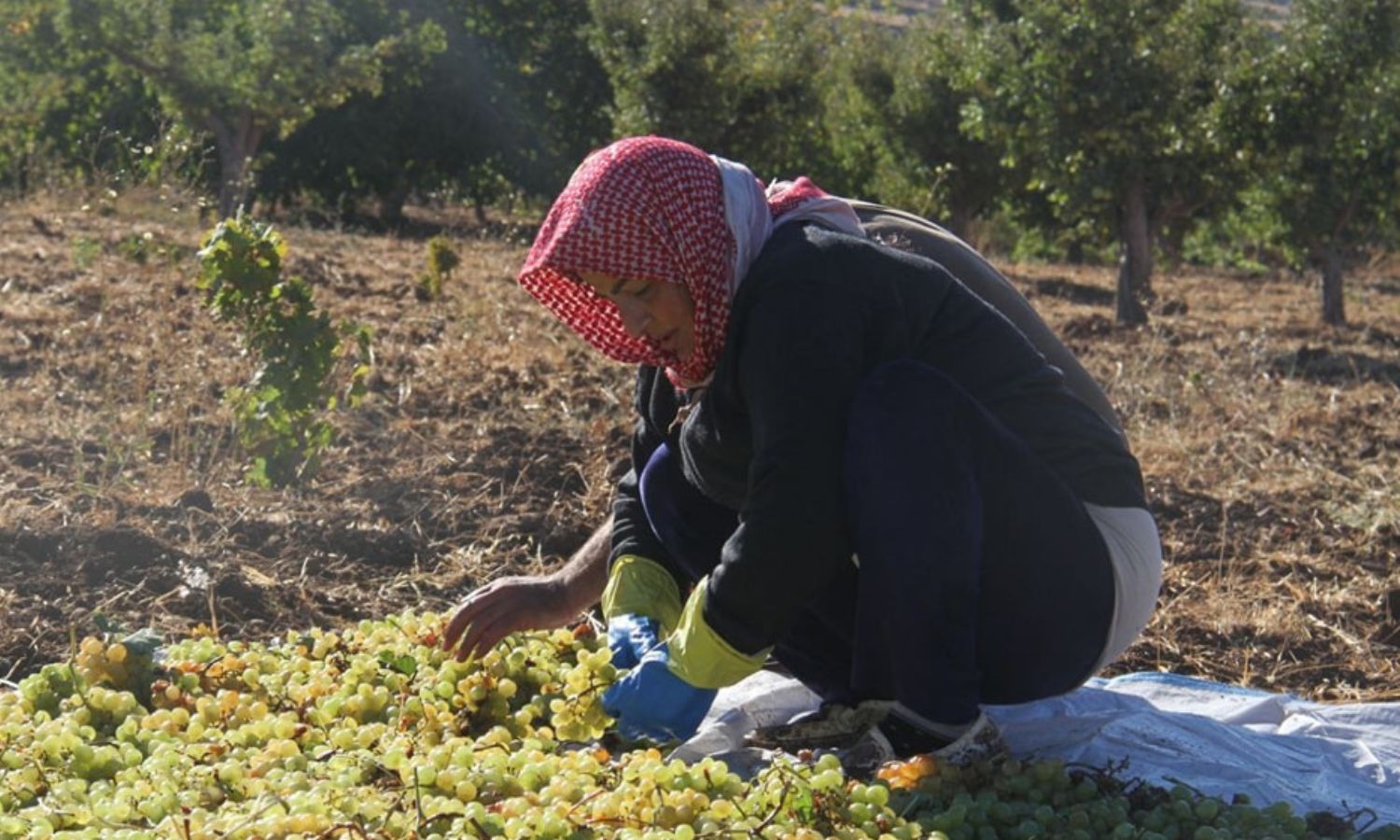



As-Suwayda – Yara Noufal
Grape farmers in As-Suwayda governorate in southern Syria are facing losses this season that they describe as “catastrophic,” especially after a low price was set that is less than half the cost of production.
Farmers stated that they are forced to sell grapes at the price determined by government entities, as there is no other outlet for the crop except by selling it to the government distillation factory.
The absence of government support, alongside rising agricultural costs such as irrigation, fertilizers, and labor wages, has deepened the farmers’ losses in the governorate, which has over 4.7 million grapevines and is considered, along with apples, one of the most widely cultivated and marketed fruit trees in the region, thanks to the volcanic red soil and suitable temperatures for this type of agriculture.
The main reason for the farmers’ loss this grape season and in most crops is the low price, which is “unfair” and does not correspond to the costs, according to farmers from As-Suwayda who were interviewed by Enab Baladi.
The estimated cost for one kilogram of juice grapes this year is 5,500 Syrian pounds, according to a report by the As-Suwayda Farmers Union (1 US dollar equals 15,000 Syrian pounds). However, after over 15 days of debate, the Ministry of Industry set the delivery price at 3,700 pounds, which provoked the farmers’ discontent, while apples are still facing the same danger due to delays in issuing their pricing.
A source in the Agriculture Directorate, who preferred to remain anonymous, told Enab Baladi that several meetings were held in the Ministry of Industry between representatives of the agricultural unions and grape distillation factories in both As-Suwayda and Homs to determine the price of juice grapes in a way that is suitable for both parties, after a month-long delay in pricing.
The delay threatened to spoil the farmers’ grapes; if they are not harvested at the right time, they become susceptible to wasp attacks and are not suitable for storage.
The source added that the finally set price of 3,700 pounds per kilogram of grapes indicates governmental collusion against farmers, as the price determined by the ministry hardly covers 65% of the estimated cost set by the Farmers Union. Furthermore, apples are also facing delays in pricing, which is a clear indication of an intention to lower their prices in line with grapes.
Grape prices in the markets are low compared to the high costs of cultivation, while the costs of transporting the production to the markets in Damascus have risen significantly due to the increase in fuel prices and the imposition of fees by government checkpoints on passing goods, in addition to the closure of export opportunities, which are controlled by traders close to the authorities, forcing farmers to sell their crops at “low” prices.
By the end of the season in early October, farmer Tammam Masoud, who owns three dunams planted with grapevines, stated that he is seriously considering uprooting them and investing the land in other crops.
He believed that the government entities treat the crop and the farmers’ efforts with “mockery,” deliberately inflicting losses on them; Masoud’s losses this season amounted to around four million Syrian pounds.
The farmer cares for 150 vines on his three dunams, with each vine producing about 15 kilograms of juice grapes, which means his total production is about two tons, with costs exceeding 12 million pounds, according to the Farmers Union’s estimate. However, he sold them for about eight million, based on the Ministry of Industry’s price, as there is no marketing for this type of grape outside the distillation factory.
The grape harvesting season began in early August, with initial production estimates reaching around 54,000 tons, as stated by the Director of Agriculture in As-Suwayda, Ayham Hamed.
He mentioned that the total planted areas in the governorate covering grapevines amount to about 10,039 hectares, with more than 4.7 million vines of various types, such as “Salti, Hallwani, and Baladi.”
As-Suwayda governorate has experienced climatic factors over the past five years, including the uneven timing of rainfall, frost, and high summer temperatures, which have affected agricultural productivity.
According to a farmer from the town of Qanawat in the As-Suwayda countryside, the average production per dunam of grapes this year reached 300 kilograms, while the average production of apples per dunam reached 250 kilograms. These are good figures, “but not excellent,” as he expressed.
The farmer, who chose to remain anonymous, explained that grapes require high temperatures to ripen in the summer, while apples need exposure to frost during winter, both of which have declined this year, potentially leading to reduced productivity.
Agricultural engineer Hussam Murshid, residing in As-Suwayda, told Enab Baladi that proper care for fruit trees requires a commitment and intensive follow-up through soil tillage, fertilizing trees, treating them, pruning, and other agricultural requirements.
He added that these requirements also need continuous support, such as the provision of fertilizers, pesticides, modern equipment, and fuel. However, since 2011, the sources of support for farmers have diminished until they nearly disappeared.
Murshid continued that it used to be the custom for the Ministry of Agriculture to provide each farmer with subsidized fuel allocations sufficient to last until the end of their season, but the amounts that reached farmers were always less than what was allocated.
The fluctuating prices of pesticides and fertilizers greatly affect farmers’ ability to produce prosperous seasons, in addition to the use of modern technology and advanced agricultural equipment, although the latter is present only in a limited capacity due to the deteriorating economic conditions faced by many farmers, according to the engineer.
if you think the article contain wrong information or you have additional details Send Correction